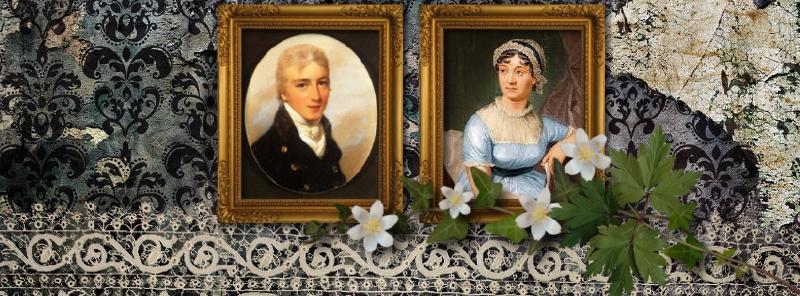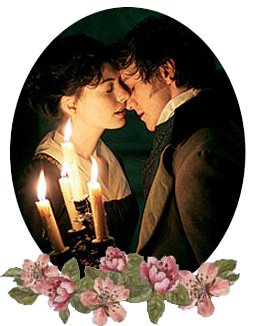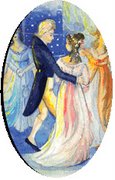Pride & Prejudice - An Essay by Beth Lau
 I read this essay, Pride & Prejudice by Beth Lau in A Companion to Romanticism, edited by Douglas Wu. First, I will briefly summarise the main theme of the essay, and then quote interesting passages for debate.
I read this essay, Pride & Prejudice by Beth Lau in A Companion to Romanticism, edited by Douglas Wu. First, I will briefly summarise the main theme of the essay, and then quote interesting passages for debate.
The theme of the essay is Pride and Prejudice as a Romantic work. The author identifies key characteristics of Romanticism in the novel, such as love of nature and individualism.
Considering Jane Austen as a writer living during the Romantic movement is extremely interesting. I hadn't made the connection until I studied the period a couple of months ago. Definitely fascinating. In this respect, Beth Lau's essay is an excellent introduction to Jane Austen and Romanticism. She considers the lack of "strong, overflowing emotion" (from a Romantic's viewpoint) and quotes a very interesting comment that, "for women of the Romantic period, rational behaviour was more revolutionary than emotionalism". (Male Romantics were revolutionary in their celebration of emotion.) Lau goes on to say that "Women, however, have traditionally been associated with emotion rather than intellect, and feminist writers fromt he Romantic period, such as Mary Wollstonecraft in her Vindication of the Rights of Women, insisted that women were capable of rational thought. Consider Elizabeth protesting to Mr Collins to consider her as, "...a rational creature speaking the truth from her heart".
 (All emphasis my own)
(All emphasis my own)
"...To the extent that Elizabeth does allow herself to be guided by her feelings, moreover, she falls into error. Bother her initial dislike of Mr Darcy and her attraction to Wickham prove misguided and result chiefly from Elizabeth's wounded pride, since Darcy scorned to dance with her at their first meeting, whereas Wickham singled her out for attention and intimate conversation during their first socil encounter. Impulsive subjective feelings, whether of love or of hatred, are untrustworthy, the novel seems to suggest. Instead, one ought to form one's opinion of another person gradually, after sufficient evidence has been gathered about that person's character, background and relationships with family members, dependents and friends. Thus, Elizabeth comes to respect Darcy after she sees his tasteful and well-managed estate and leans that he is a good brother, master and landlord, whereas her regard for Wickham dissipates when she finds out that he has been dishonest and unscrupulous in his dealings with others." 
Right. Yes, Elizabeth is mistaken in her prejudice. But I disagree with Lau's comment that the novel suggests that "impulsive subjective feelings, whether of love or of hatred, are untrustworthy". We all know the power of a 'gut feeling' and of 'trusting intuition'. I think it's too broad a brush to suggest that ALL impulsive subjective feelings are untrustworthy. Not all of them are. The novel is balanced. Lizzie's 'impulsive subjective feelings' towards Bingley turn out to be very correct. And to take the idea a step further, I am reminded of this beautiful quote by Lebanese philosopher Kahlil Gibran:
"It is wrong to think that love comes from long companionship and persevering courtship. Love is the offspring of spiritual affinity and unless that affinity is created in a moment, it will not be created for years or even generations."
The second bolded paragraph I just hate. Hate! What can I say. Hate! Let me get back to it ... (comments section)
"Besides suggesting that informed judegment rather than impulsive emotions ought to guide women in their choice of a husband, other aspects of the novel's depictionso fcourtship and marriage appear anti-romantic. ... Moreover, there are no passionate love scenes in Pride and Prejudice. (!!!) When Elizabeth and Darcy finaly come to an understanding and agree to marry (Vol III, Ch. 16), the emotional intensity of the scene is downplayed; Elizabeth's and Darcy's words are briefly summarised, rather than presented verbatim, and no embraces or kisses are mentioned. One can even question how passionate Elizabeth's feelings for Darcy are at the end of the novel. (passes out) Her love is said to be based on 'gratitude and esteem' (p. 279), which may strike some readers as rather bland impulses."
What can I say?! There is nothing to say! "One can even question how passionate Elizabeth's feelings for Darcy are at the end of the novel". You have GOT TO BE KIDDING ME!!!!

"...Elizabeth's 'lively mind' seems checked and subdued in the second half of the novel. Susan Fraiman argues that Elizabeth's humiliation and self-castigation after she reads Darcy's letter mark a turning point, after which Elizabeth grows more passive and uncertain of her judgement and Darcy assumes greater power and authority as he 'magically set[s] everything straight', arranging Lydia's marriage, reuniting Jane and Bingley, and transporting Elizabeth to Pemberley (Fraiman, Unbecoming Women, p. 79). Readers may feel that Elizabeth's distinctive personality is repressed as she evolves from witty antagonist to grateful admirer of the proud and powerful Mr Darcy."
In regards to the first quote, Elizabeth is suffering the uncertainty and raging hormones of a first true love! She may be uncertain of her judgement of the Darcy situation, but this is only natural! It hardly suggests a full transformation of character, but rather her change in relation with a certain person ... I totally disagree with the final bolded sentence. No, I do not feel Elizabeth's witty charm is repressed by her love/relationship with Darcy! On the contrary - she is very much the same woman he fell in love with, the woman he admired for the "liveliness of her mind" (Ch. 60). And let me close with one of my favourite paragraphs, one of the last paragraphs of Pride & Prejudice, which illustrates the folly of the suggestion of Elizabeth-lost in her love for Darcy. 
Chapter 61: Pemberley was now Georgiana's home; and the attachment of the sisters was exactly what Darcy had hoped to see. They were able to love each other even as well as they intended. Georgiana had the highest opinion in the world of Elizabeth; though at first she often listened with an astonishment bordering on alarm at her lively, sportive, manner of talking to her brother. He, who had always inspired in herself a respect which almost overcame her affection, she now saw the object of open pleasantry. Her mind received knowledge which had never before fallen in her way. By Elizabeth's instructions, she began to comprehend that a woman may take liberties with her husband which a brother will not always allow in a sister more than ten years younger than himself.











































3 comments:
Michelle, I agree with your opinions about the article and will only add a few comments.
Ms. Lau said quote:
Impulsive subjective feelings, whether of love or of hatred, are untrustworthy, the novel seems to suggest.
Ms. Lau seems to have forgotten that the original title Jane wanted for P&P was “First Impressions”. Her use of the words “impulsive subjective feelings” equate to ‘first impressions’ to me. Anne Radcliff’s book “The Mysteries of Uldolpho” was read by Jane and it contains in the first chapter a discussion of ‘first impressions’. Check out my post HERE for my discussion of that. Ashton’s discussion which follows mine may be of interest too.
You said quote:
I think it's too broad a brush to suggest that ALL impulsive subjective feelings are untrustworthy. Not all of them are. The novel is balanced. Lizzie's 'impulsive subjective feelings' towards Bingley turn out to be very correct.
I say that first impressions are okay as long as we do not shut out our rational mind for later considerations. Your quote by Gibran reminds me of the old saying that “familiarity breeds contempt”- which is not always true when there really is ‘true love’.
You said quote:
What can I say?! There is nothing to say! "One can even question how passionate Elizabeth's feelings for Darcy are at the end of the novel". You have GOT TO BE KIDDING ME!!!!
Well, just in case you need any further convincing about ‘passion’ in any of Jane’s works, just check out this link to a collection of Jane Austen's "Passionate Passages" in every one of her novels. I enjoyed every minute of collecting them.
As for your quote from Chapter 61 of P&P – I say: Amen! I rest my case!!
Linda the Librarian
Hello Ladies and’ little peanut’, I missed you a lot and unfortunately I will continue to do it for the rest of the summer, due to some motherly duties...
You’ll see, dearest Maria, how much your life will change in few months. Don’t panic, there is still some ‘me time’ but you have to be a very good negociator when it comes to own it in fact every day :)
I resonate with you Michelle in disliking that much (3x Hate) the second paragraph provided for debate. “What can I say”… that its authoress does not know what love is and she certently did not ‘read’ Jane Austen.
Elizabeth’s letter to her aunt, Mrs. Gardiner (P&P Vol. III, Chap. 60): “I am the happiest creature in the world. Perhaps other people have said so before, but not one with such justice. I am happier even than Jane; she only smiles, I laugh.” ...and I’m rolling in a fit of laughter… Good God! How can anyone read this chapter, such simple but yet so brilliant words and still wanting “passionate love scenes”?
Thank you Icha for uploading the article about Jane’s admirer from Ireland. I have added to the comments as you suggested that one more strange coincidente: the name of Mr Fletcher’s grandmother before marriage was Gardiner.
Infinity of Jane Love
mariana, good to see you. I'm not yet panicking over not having any me-time. Perhaps I will. I'm just longing to see who's in there. You know there might me two?! jeez, I hope not. ;) Well we'll see at the ultrasound on the 31th of July.
reg. the Paper. Jeez. The woman has totally not gotten JA's PP at all. Seriously, the passion is bubbling underneath all the time. Because of the more suggestive passion, it is more enjoyable than full out snogs and such.
/hugs and kisses from Maria and Peanut
Post a Comment